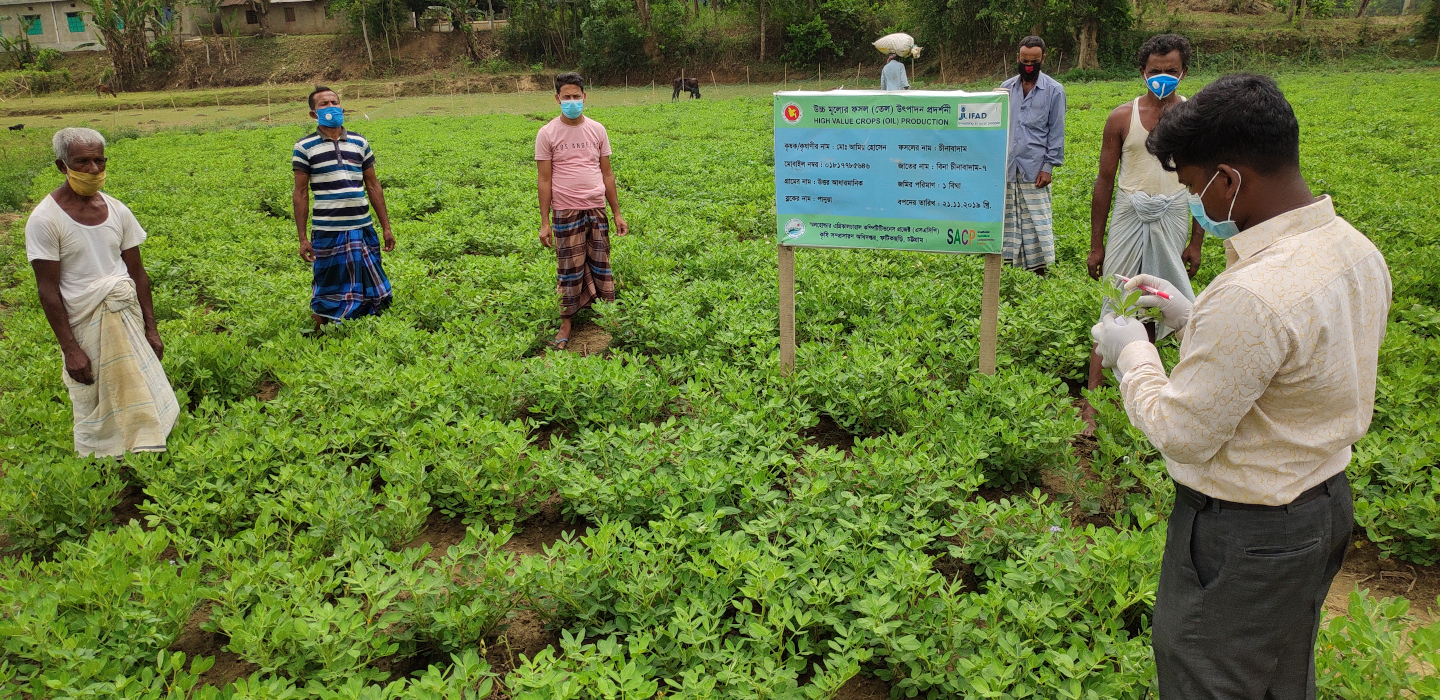Long-term development supports quick action in a crisis - an update from Asia and the Pacific
IFAD Asset Request Portlet
ناشر الأصول
Long-term development supports quick action in a crisis: an update from Asia and the Pacific
من Nigel Brett

As the world weighs strategies to rein in the coronavirus crisis, farmers continue caring for their high-value crops in Chattogram, Bangladesh. Keeping a safe distance, farmers meet with a government agriculturist on a peanut field as part of the IFAD-funded Smallholder Agricultural Competitiveness Project (SACP) activities in-country.
It has been really inspiring to receive updates from the field over the past two months illustrating how IFAD-supported projects are continuing to deliver much-needed support to farmers and vulnerable rural communities in spite of the disruptions from the COVID-19 pandemic. Even with many of the project staff working under lockdown conditions, important project services are being provided. I am also very encouraged to see so many project-supported producer groups and livelihood collectives carrying on. The activities they coordinate are vital for small-scale farmers and producers, including sales of inputs, managing harvests and marketing perishable crops. This “keep calm and carry on” approach is a real testament to these member-owned organizations and how they empower poor rural communities.
In Cambodia, the ASPIRE project is rapidly enhancing its support for production of short-cycle agricultural commodities to mitigate the risk of food shortages, including green leafy vegetables and chicken eggs. ASPIRE and AIMS (another IFAD-supported project) are mapping all project-linked households in a GIS database, which will help to focus project and extension service delivery, as well as facilitate integration with other databases to provide online services. In addition, a call centre has been established by ASPIRE to support farmers with extension. Through a Korean-funded grant, a virtual market app called Chamka is also being developed. These are ways in which digital tools enable service delivery and value chain development to continue while maintaining social distancing.
In India, projects have been raising awareness, disseminating information to IFAD beneficiaries about the available government relief, while also adapting project activities to changing local conditions. The ILSP project in Uttarkhand has been working through producer groups and livelihood cooperatives to ensure that wheat harvesting can continue and that marketing of perishable crops goes on unabated, with cooperatives becoming aggregators, and federations transporting produce to local market outlets. ILSP is also in the process of setting up Rural Business Incubators as a one-stop shop for providing access to finance and technical assistance to those interested in setting up enterprises. This will be particularly beneficial for returnee migrants. The FOCUS project in Mizoram has benefited from quick thinking by a State-level COVID-19 task force, ensuring that vital supplies of seeds (primarily ginger, turmeric and mizo chilli) reached farmers in time for planting, and also ensuring timely release of funds to farmer groups to purchase inputs. The project is also prioritizing cassava in local production systems to enhance local food security.
In Bangladesh, the SACP and NATP projects are taking a number of actions to keep the food supply and productive activities going. This includes supporting poor households in growing fruits and vegetables in their yards; distributing seeds and fertilizers to farmers, particularly for pre-winter and winter vegetables; facilitating safe transport and logistics to get products to markets (for example, collecting and chilling milk); promoting “markets on wheels,” with products like milk, eggs and poultry sold out of mobile vans; and setting up virtual training sessions for farmers.
Also in Bangladesh, ongoing projects being implemented by the Local Government Engineering Department are fast-tracking payments to construction workers who lost employment due to suspension of civil works; training Labour Contracting Society members on COVID-19 awareness and providing them with insurance coverage; and providing cash support and income-generating activity training to particularly vulnerable women-headed households. The PACE project, implemented by Palli Karma Sahayak Foundation, is focusing on safe transport and logistics for inputs to farmers and outputs to markets in disadvantaged rural areas while maintaining health and safety protocols.
IFAD projects in China were already designed with a heavy emphasis on reducing vulnerability and building resilient communities and local institutions, and hence have not needed to be re-purposed following the COVID-19 outbreak, though they have adapted to changing conditions. We’ve also seen great examples of sustainable results. The YARIP project in Yunnan, which contributed to building the capacity of women’s farmer cooperatives, officially closed in 2018. But the cooperatives are still fully functioning, and when COVID-19 struck, members quickly moved into the production of face masks. They also learned to use digital platforms to continue their businesses despite restrictions on movement. Cooperative members are now making full use of these platforms for marketing and sales. Projects are taking advantage of other digital tools as well, including WeChat groups for easy remote interaction, online tutorials, online bid evaluation procedures for procurement, and video conferencing to keep operations going.
In Bhutan, the IFAD-financed CARLEP project has been focusing on increasing food and nutrition security, especially with nutrition-rich seasonal vegetables. It has encouraged use of fallow land to increase production. Poultry is also being introduced into CARLEP-supported villages as a local source of protein in order to increase dietary diversity.
All four ongoing IFAD projects in Pakistan are adapting to changing conditions, with an emphasis on social protection and safety nets. The GLLSP project is providing grants to extremely vulnerable households for the purchase of income-generating assets. The NPGP project has created an “enhanced” package for extremely poor households in the 23 poorest districts of Pakistan, which includes a cash grant, in order to minimize distress sales of household assets. The ETI-GB project team undertook a dedicated COVID-19 awareness campaign and has now resumed work in line with special operating procedures. The project is focusing on building farm-to-market roads, activities that develop land and irrigation schemes, and employment opportunities to many who have remained jobless due to the lockdown. Finally, the SPPAP in Punjab is supporting a social safety net for rural women, with cash assistance provided to vocational trainees.
In Tonga, at the government’s request, the TRIPII project is focusing on COVID-19 responses such as supporting farmers in preparing their land, producing seedlings, and distributing fruit trees, vegetables, and root crops. To address disruptions to food imports and distribution, TRIPII is expanding support to rural households to emphasize fresh foods, tubers, livestock and fisheries, which fulfil unmet local demand and increase community self-reliance.
There is still a long way to go until we emerge from this unprecedented crisis, but on-going projects and partners across the region are showing unswerving commitment and finding safe, innovative and flexible ways to ensure vulnerable populations continue to be supported, while at the same time keeping sight of long-term development goals.
تاريخ النشر: 27 مايو 2020